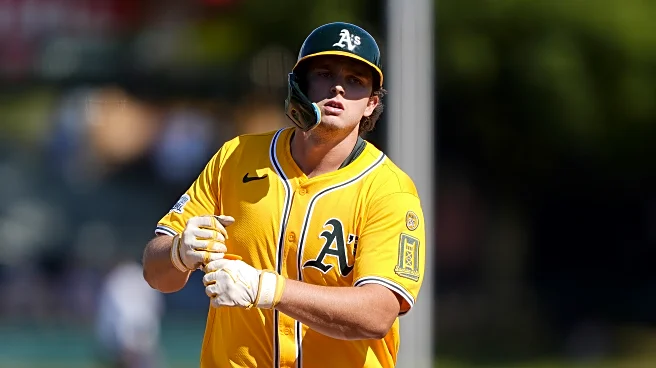Like with the Academy Awards, sometimes the committee gets it right and sometimes it leaves you dumbfounded as to how a group of people convened for the sole purpose of having good judgment can see things
so differently from you. And like the Academy Awards, at the end everyone is talking about a guy named Will Smith.
It is now, officially, awards season with the Rookies of the Year and Managers of the Year now behind us, Cy Young Awards and the like to follow. At least to date, the right guys are winning.
AL ROY: It’s Unanimous — Nick Kurtz
It’s not homerism to opine that Kurtz was rightfully a unanimous selection for Rookie of the Year. Seldom in MLB history has a rookie with over 400 PAs produced an OPS over 1.000 like Kurtz’ .290/.383/.619 slash line gave him.
Despite missing the season’s first 4 weeks, in 117 games Kurtz managed to put up 4.6 WAR which was by far the highest amongst his rookie bretheren. His post All-Star break numbers read like a misprint: .322/.429/.678 (199 wRC+).
But also refreshing was that the national awards voters did not get overly caught up in the east coast bias that was Roman Anthony and correctly gave Jacob Wilson 2nd place in the voting.
Don’t get me wrong, Anthony was sensational and is poised to be a star. This is a 21 year old who had a .396 OBP, 8 DRS/4 OAA in RF, a 140 wRC+. He probably would have rightfully won ROY in a typical season.
But Wilson not only batted .311 in an era where almost no one hits .300 anymore, he was hit by a pitch on the hand that sapped his performance in an ugly July (7 for 50), but before and after, when healthy, he hit a remarkable .330.
I won’t be at all surprised if Anthony has the better career of the two, but Wilson had the better rookie season even if it was legitimately close. WAR agrees, FWIW, 3.5 to 2.7.
It would have been easy for voters to drink the east coast kool aid and give Anthony runner up status but his late call up combined with his season ending injury limited him to 71 games and it’s simply easier to put up gaudy numbers (like a .396 OBP) in a smaller sample.
NL Rookie Of The Year: Quantity Matters
In the National League it was more competitive at the top, where Braves catcher Drake Baldwin (183 votes) topped Cubs pitcher Cade Horton (139 votes) along with Brewers Caleb Durbin and Isaac Collins (69 and 62 votes).
I saw enough of Baldwin to know that this dude can really hit, and the stats bore it out: .274/.341/.469, which is unusual for a catcher. Also impressive was his 15.2% K rate. Baldwin didn’t rate especially high on defense, a tick below average, which helped to give Horton et al a shot to compete with him.
Horton was a worthy candidate in his own right, posting an 11-4 record with a stellar 2.67 ERA, but he wasn’t called up until May 10th and only made 22 starts. That is an essential consideration — in contrast Baldwin was on the roster all season and appeared in 124 games. Horton’s K rate of 7.60/9 IP is also a possible red flag for sustaining success going forward, especially given his solid velo (95.5 MPH).
I think Baldwin was the right #1 pick and Horton the correct #2, with the Brewer Brothers forming the next tier. Once again the voters got it right.
AL Manager Of The Year: Winning A Close Vogt
The AL Manager of the Year award was one of the most difficult to handicap because there were several natural choices.
In John Schneider (Blue Jays) you had a team that despite a sluggish start and little pre-season love from pundits, went toe to toe with the likes of the Yankees and Red Sox and hung on to capture the AL East.
In Dan Wilson (Mariners) you had a team that was looking up at the Astros most of the season having spent almost all millennium missing the playoffs. Yet Seattle surged into 1st place and never looked back, capturing the AL West from a team that had a stranglehold on it for nearly a decade straight (60 game seasons notwithstanding).
Alex Cora (Red Sox) and AJ Hinch (Tigers) didn’t come close to winning but could make their own case as they got and kept their teams in the thick of the division race from wire to wire.
But I think voters got it right when they gave the nod to Cleveland’s Stephen Vogt, as what the Guardians accomplished was as historical as it was improbable. Never before had a team come from 15.5 games back to win the division, and the morale, sticktoitiveness, moxie it takes is probably more a reflection of a manager’s influence than decisions about whether to bunt on August 12th or when to pull the starting pitcher on May 27th.
“I Believe In Stephen Vogt” got his Guardians to believe, to persist, and to finish 24-8 which is what it took to make history and capture the AL Central. In a year where several managers could lay claim to the award, Vogt was the rightful victor.
NL Manager Of The Year: Small Ball FTW
The Milwaukee Brewers were 22nd in MLB in HRs. They were also 1st in MLB in wins with 97. They did it without a Tarik Skubal or a Garrett Crochet leading their rotation, and their closest thing to a household name, Christian Yelich, had a kind of a down year.
The Brewers ran like crazy, with a league leading 164 steals, rarely struck out (5th lowest total in MLB), used creativity and havok to overcome the lack of power or aces, and played a brand of baseball that requires more acumen from its manager than a “3 aces/TTO hitters” roster would.
Murphy rightly got 27 of 30 1st place votes, with Reds manager Terry Francona deservingly earning runner up honors for sneaking the flawed Reds into a wild card spot albeit with a paltry 83 wins.
Do you agree with all the voting so far? Many votes are still ahead and we will see how those tabulations gibe with our sensibilities. It may not be as riveting as the season or the hot stove, but it’s all we have right now and at least it’s something.









